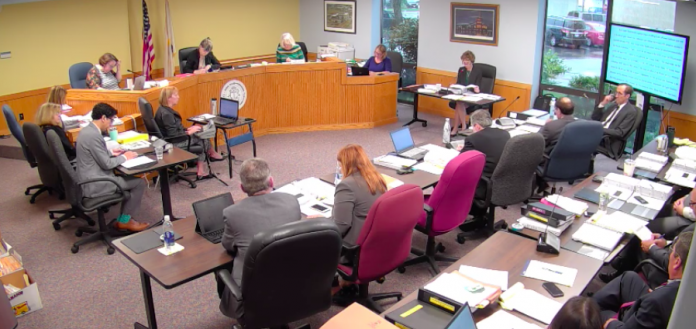
BURRILLVILLE – Just days after the Energy Facility Siting Board received testimony regarding how Invenergy, LLC has made $26 million in profits by selling electricity in New England before building their proposed power plant in Burrillville, the group that has been purchasing the power is seeking to terminate the contract.
Independent System Operator New England filed an application with the Federal Energy Regulatory Commission to cancel a CSO – or capacity supply obligation – with the company.
Understanding how the Chicago-based developer has been profiting from the local market without the required state approvals for erecting a 1,000 megawatt gas-burning plant off of Wallum Lake Road is a lesson in the complex world of energy sales.
ISO-NE operates the regional power grid and awards the CSOs at annual auctions three years before the power is needed to ensure that there is enough supply.
Setbacks in the approval process have pushed back the projected operation of the Burrillville plant, dubbed the “Clean River Energy Center,” from 2019 to 2021, an issue that likely caused ISO-NE to file for the contract termination.
Invenergy won the CSOs in an auction in February of 2016, and was technically required to start supplying power to the grid in 2019. The company pushed back the timeline by selling the obligation to another supplier, but ISO-NE rules typically only allow such an arrangement to last for one year.
With that deadline long past, Invenergy still faces a number of hurdles, including a lawsuit challenging its water supply.
According to a recent release decrying the process from the town of Burrillville, which has mounted legal opposition to the plant, Invenergy collects $7.03/kW-month to provide the capacity, but then turns around and purchases replacement capacity from other generators at a reduced cost – most recently $3.67kW-month.
The release pointed to expert supplemental testimony provided to the EFSB last week by Glenn Walker, of George Sansoucy, P.E., LLC, on behalf of the town.
Walker said that there is no need for the Clear River Energy Center, noting that over the last five months, new regional developments have indicated there will be about 3,000 megawatts of renewable energy coming online.
“Since Invenergy’s filing in October 2015, the lack of need for CREC has been consistently demonstrated by many factors, including declining demand, regional policy with respect to global warming, and rapid changes in the Rhode Island and New England electric markets,” Walker said.
It is a claim that has been a focus of debate before the EFSB, with lawyers for Invenergy disputing the assertion, at times even describing the region’s need for such a power supply as, “desperate.”
Walker said that Invenergy’s total three-year benefits/gross profit will soon topple $46 million, and pointed out that often, when such a plant completes the regulatory process, the facility is not actually built until decades later.
“It is very likely Invenergy is seeking to simply permit the project and either sell the permits to another entity or to wait for better market conditions before moving forward,” he said.
Lawyers from an environmental advocacy group known as the Conservation Law Foundation have joined the town of Burrillville in opposing the plant, and CLF Senior Attorney Jerry Elmer took Walker’s testimony a step further, implying that delays in Invenergy’s application process have been intentional.
“Folks have been wondering for months why Invenergy seems to be slow-walking the permitting process,” said Elmer. “Now we know. Invenergy is making tens of millions of dollars from ratepayers.”
The testimony came amid Invenergy’s final hearings before the EFSB, and the agency is expected to issue a final ruling on the plant by early 2019.
In an interview with The Providence Journal this week, Michael Blazer, chief legal counsel for Invenergy, said that the $46 million does not represent a profit, because the company has spent $44 million so far on permitting.
Blazer reaffirmed his company’s commitment to building the facility, playing down the importance of the CSO. The obligations help companies to secure financing from banks and other investors, but Blazer said Invenergy will still be able to build the plant, and turn a profit.






